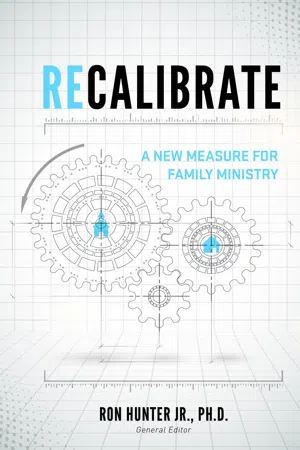
- 240 pages
- English
- ePUB (mobile friendly)
- Available on iOS & Android
eBook - ePub
About this book
Are you seeking clarity in your vision for family ministry? Imagine bringing together fifteen ministry experts who have accumulated a wealth of experience and wisdom on that very topic. This book is the message from those experts revealing a clearer vision for the future of any ministry. Each chapter addresses a distinct area of church ministry, reveals current unhealthy norms, offers new norms, and most importantly provides ways to measure each area. It is vital to the future of your ministry to recalibrate to a healthy norm. Recalibrate will help ministry leaders reach that goal. All royalties from the sale of this work go to support D6 International.
Frequently asked questions
Yes, you can cancel anytime from the Subscription tab in your account settings on the Perlego website. Your subscription will stay active until the end of your current billing period. Learn how to cancel your subscription.
No, books cannot be downloaded as external files, such as PDFs, for use outside of Perlego. However, you can download books within the Perlego app for offline reading on mobile or tablet. Learn more here.
Perlego offers two plans: Essential and Complete
- Essential is ideal for learners and professionals who enjoy exploring a wide range of subjects. Access the Essential Library with 800,000+ trusted titles and best-sellers across business, personal growth, and the humanities. Includes unlimited reading time and Standard Read Aloud voice.
- Complete: Perfect for advanced learners and researchers needing full, unrestricted access. Unlock 1.4M+ books across hundreds of subjects, including academic and specialized titles. The Complete Plan also includes advanced features like Premium Read Aloud and Research Assistant.
We are an online textbook subscription service, where you can get access to an entire online library for less than the price of a single book per month. With over 1 million books across 1000+ topics, we’ve got you covered! Learn more here.
Look out for the read-aloud symbol on your next book to see if you can listen to it. The read-aloud tool reads text aloud for you, highlighting the text as it is being read. You can pause it, speed it up and slow it down. Learn more here.
Yes! You can use the Perlego app on both iOS or Android devices to read anytime, anywhere — even offline. Perfect for commutes or when you’re on the go.
Please note we cannot support devices running on iOS 13 and Android 7 or earlier. Learn more about using the app.
Please note we cannot support devices running on iOS 13 and Android 7 or earlier. Learn more about using the app.
Yes, you can access Recalibrate by Ron Hunter Jr. in PDF and/or ePUB format, as well as other popular books in Theology & Religion & Christian Ministry. We have over one million books available in our catalogue for you to explore.
Information
Topic
Theology & ReligionSubtopic
Christian MinistryRECALIBRATE
the Challenges of
Family Ministry
Family Ministry


10
The Picture Frames Are Different but Single Parents and Stepparents Are Families Too
The Picture Frames Are Different but Single Parents and Stepparents Are Families Too

Current Unhealthy Norms
For many, the “family portrait” has been broken. Shattered single parents are grasping for hope as they navigate the complexities of transition and adjustment while trying to keep their children’s emotional turmoil to a minimum. The once believed dream of “happily ever after” has turned to divorce papers, parenting decrees, dividing the dishes and furniture, and only seeing their kids every other week or weekend. If there was ever a time for the church to engage and bring the true unfailing love of Christ to a person’s life, it is as they are walking the road of divorce or stumbling through the emotional fallout the first few years after. In shame and defeat, many single parents will isolate and not engage in their normal church activities; what was once an experience of joy and family togetherness may, at times, seem to be a reminder of their failed marriage and their aloneness. Staying home on Wednesdays and Sundays may be a result of their own sadness and complete exhaustion of the transitions happening in their lives. We cannot assume single parents are pulling away from the church; what they are struggling with is their loss of identity as a family, the predictability of the rhythm of life they had with their spouse, and trying to “explain” what is happening to people who may not always be kind. They are in emotional shock sometimes to the point of being paralyzed to make decisions, let alone make their bed, and get to church.
Oh to be the spiritual salve to the single parent soul; to come alongside and offer a cup of cold water in the hot and dry desert land of divorce. God can redeem and make something good out of what was broken. There is still great value in each parent and child and, quite often, the parents will need outside eyes to help them continue to see their own value.
Blind Spots. Even wonderful churches have blind spots. The blind spot could be they do not recognize the extended stress and inconsistent schedule a teen has to encounter when parents are in two different locations and that getting parents to sign off on camp forms and pay deposits on time can be very difficult. A child in a single parent family may need extra financial support to be able to attend camp at all. Inconsistent attendance in Sunday School or extra-curricular church activities (choir, youth group, serving) might be specifically due to the child going to the “other parent’s home” and simply having no way to participate.
Family functions at church most likely assume a two-parent family, thus unintentionally creating events and activities that expand the awkwardness for a single parent, if not clearly pointing out their aloneness.
Leaders may not realize that a single parent is still part of a family: now it is a single parent family, nevertheless a family with a leader and a parent who needs support. Simple descriptions or admonishment from the pulpit can get overlooked and accidentally appear to forget the single mom and the single father on special days like Mother’s Day and Father’s Day.
When it comes to sermons or activities supporting marriage, some leaders honestly do not understand the differences are in a first time marriage versus a blended family marriage. The blind spot is in thinking they are the same. Often well-intended events are planned for married couples and assume that anyone who is a couple will have the same motivation to attend or are facing the same struggles.
Principles in a traditional marriage retreat may not work in step-family marriage. Sometimes step-couples feel they are failing—themselves, the church, and God. It’s not working so they get caught in the trap of being marginalized and isolated by the programming that churches generally lean into when they don’t know the distinct differences. There are significant relationship complications between “bios” and “steps” (both kids and parents) that simply do not exist in an intact family system.
In an intact family, rarely does one in the house wonder whether the other people love them or even care that they exist at all. Even an annoyed teenager can still sense an unfailing love from their parents while being grounded or disciplined; however, in a single parent family, a child quite often feels jealous of the new dating relationship their parent is enjoying because it takes time away from the parent spending time with them. In nuclear, intact families, most kids don’t feel jealous of mom and dad loving each other, or mom and dad going on dates or even long weekends away; instead, they mostly gain a sense of security and calm—quite the opposite for kids in stepfamilies. Kids in stepfamilies can feel very lost and alone, forgotten and not seen, and may even begin to sabotage the adult relationship out of jealousy and fear of losing contact with their own parent.
Recalibrate to a New Norm
What if every children’s pastor and youth pastor (and all the trained volunteers) had an in-depth understanding of the complications in single-parent households and stepparent households so he or she could more authentically speak to the realities the kids are living in? What if communication with kids and families was intentional so the kids that only come to church with their single parent twice a month were still connected and known? What if volunteer leaders would be assigned to specifically disciple and pursue teens who have divided homes—maybe that would mean driving across town to grab coffee with the teen on the weeks they are at the “other home” so the ongoing connection was real and relevant to their day-to-day lives?
What if a specific on-going resource was made available to kids who need scholarship support to attend camps and big ticket activities and this was done pro-actively so they did not have to ask or be embarrassed to tell their leaders they can’t afford to come? What if adult Sunday School classes made a priority to ask more financially established adults to be the portal of generous compassion to be sure that no kid missed these life-changing opportunities and in the process was able to see a little “peek” at how their $200 donation changed the life of a junior higher?
SOLUTIONS—Reaching Others Who Are Different From Us. Let’s begin by identifying what a single parent, stepparent, and co-parent is.
Single parents. The most common type of single parent families are divorced parents; however, don’t forget the widows and widowers who lost their first spouse to death. Also, consider many adults cohabitate and then divide (but don’t need to divorce) so there are many non-married (never divorced) single parents in your community. One other type of single parent is a young, unwed single mom who may be living at home with her parents or living alone with no support from her parents or the baby’s father.
Stepparents. Research shows the step family is now the number one family type in America. There is also wonderful research that shows how beneficial a healthy stepfamily can be when a child has the opportunity to live in a stepfamily before they launch into young adulthood. The impact of a healthy stepfamily marriage on a child will improve their emotional development and enhance their ability to have a lifelong marriage of their own.1
Co-parenting. Co-parenting is when biological parents live in two separate homes and have to communicate, share time, share financial obligations, and make on-going parenting decisions. It is the essence of being in the “business of parenting,” but doing so from two separate addresses. Sometimes co-parenting can mean a grandparent or another caregiver is part of the family equation as a primary caregiver, but for the purpose of this chapter we will land on it being a mother and father who are no longer in a personal relationship but maintain a parenting position in the child’s life. These parents may have been married and are now divorced or were cohabitating and now have moved apart.
Next, let’s look at a few points of “lingo” that are important and unique to single parent, stepparent, and co-parent dynamics:
Parenting time. This is the legal term for how much time the children spend with their father and how much with their mother, as well as when and where they transition between homes. In most cases, when a child is having “parenting time” with their mom, the mother is not legally required to have the child attend or participate in activities requested by the father and vice versa. Some co-parents are able to negotiate exceptions to this, but the most common co-parent scenarios expressed will, at a minimum, create inconsistent church attendance due to parenting time.
Attachment. John Bowlby was the first attachment theorist who identified factors related to the “lasting psychological connectedness between human beings”2 and who also defines ways to measure attachment. In traditional families, kids and parents usually have secure attachments with one another. In single parent and stepparent families, kids and parents quite often have “competing attachments.”
Competing attachments are created by having a feeling of love and loyalty to one person that creates conflict with another person. Example: A child in a single parent family loves both mom and dad; however, now mom and dad don’t love each other so they become, in a sense, in conflict with their own parents because the love and attachment they used to enjoy when they were a three person home is now confused and exasperated when mom and dad live separate from one another and often maintain a hostile relationship. Competing attachments are multiplied in a stepfamily marriage because a new wife may now be an instant stepmom to three children and quite often see the stepchildren very objectively while seeing her own biological children with a deep attachment, thus having what is called “bio fog” that inhibits her ability to be objective about her own children. In the same scenario, a father can see his own biological children more subjectively than his new stepson, with whom he has not yet formed a strong attachment. Discipline styles, parenting styles, and personality styles also play into the challenge with stepfamily marriages and can often make it almost impossible to negotiate and find a satisfying “middle ground” when making parenting decisions about the children collectively.
Family Systems. We all come from a family of origin (birth family) and carry dynamics of our childhood into our adulthood. When a couple marries they create a new system. When children are added to the marriage that is another system; they are still a couple and they are also parents so there are multiple “systems” active at all times. As parents divide and often re-couple, that changes the systems drastically and often kids get caught in the on-going anger and conflict between systems.
How do you engage with multiple family systems and types? If you want to know what the single parents and stepparents need in your community, start by enlisting a few of them to serve on your planning committees and ask them strategic questions. When you are intentional to include single parents and stepparents in your programming and planning, important considerations will be highlighted for each family type. Examples include: What is it like for a single parent or stepparent on Mother’s Day and Father’s Day to sit in your worship service? Do they feel recognized and appreciated or lumped into the same type of family as an intact family? What other holidays are significant for single-parent families and stepfamilies and how does that impact their children? Holidays quite often mean hurt feelings, alone time when kids are with the co-parent, and the overwhelming quiet of an empty home. Helping single and stepparents navigate the emotional and social landscape of holidays can be a wonderful way to help them feel seen and heard in your church.
Some possible ways to help these unique families:
Scholarship funds. One church created an on-going scholarship fund to help two students in the youth group who had recently lost their mother in a car accident. Imagine the stress a junior high kid might feel, knowing their family is already hurting financially because of the recent death and then they are handed a camp registration form that requires a $150 deposit? What child is going to want to present that to their grieving parent, knowing things are already very tight financially, and yet what kid would want to be left behind that weekend? These two kids never had to ask for help (which can be very embarrassing and frustrating); the youth pastor identified a specific need and found older couples in the church to fund their camp fees and activity fees for about two years right after they lost their mom, so it was never even a question or concern they would be left out or left behind. He saw the situation and activated his own request to a few people in the church that were honored and excited to see their financial support meeting a real-life need in their congregation. The single dad was floored when time and time again the youth pastor simply said, “Your kids are already signed up for camp. I just need you to sign their medical release form.” What a great blessing to the father, who in his expansive grief was able to simply exhale and thank God for being seen, being known, and being supported. This simple act ministered to a specific need. The church body was caring for its own and keeping those two kids connected to the very heart of God in a time they were sinking in emotional and relational pain.
Double lunch. Consider asking a large couples class to ...
Table of contents
- Cover
- Title Page
- Copyright
- Table of Contents
- Introduction
- Recalibrate the Big Picture
- Recalibrate Age-Specific Ministries
- Recalibrate the Challenges of Family Ministry
- Contributors